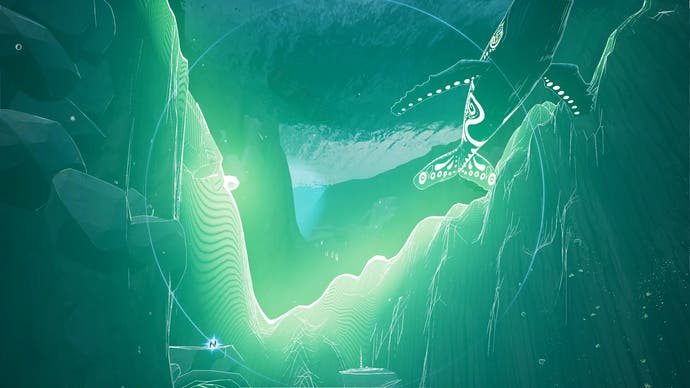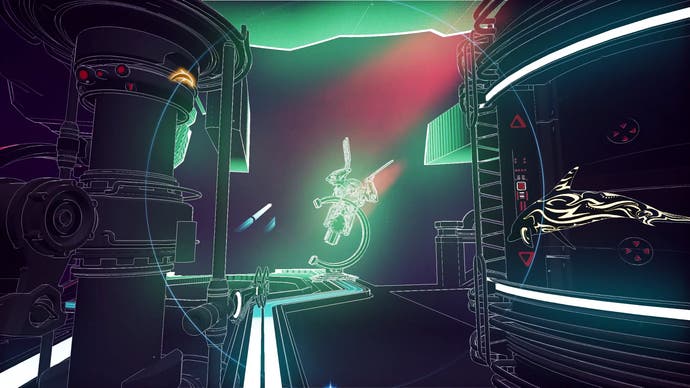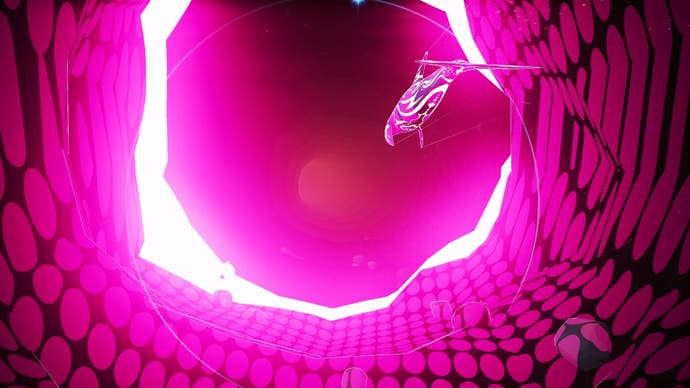Jupiter & Mars is a VR treat with a vital message
Ocean software.
The first time I met James Mielke, there was a whale involved. A space whale, more precisely, a galaxy in length from head to tail, swimming through the glittering firmament and basking in the rays from a billion distant suns. Sure, this whale had seen better days: it was covered with bright, glossy shards of cosmic infection, and as I scoured the infection away the whale began to sing to me. Each of those shards on its flesh triggered a single individual sound file - the whole thing was a sequencer of sorts. But it was also never less than a whale, a space whale, alive and playful in the deep. Once I had cleaned its back, it even rolled over so I could get to its noble belly.
This was in Tokyo, somewhere around 2010, and Mielke was a producer at Q Entertainment and working on Child of Eden, the studio's glorious and strangely timeless Kinect game. Eight years later, I met Mielke again - in Camden this time. And this time there were dolphins involved. Two of them.
It was hot that day, but as soon as I pulled on the PSVR headset, the heat seemed to vanish. I was suddenly floating in a white-box world, the contours of the landscape around me rippling gently with the currents. I looked up, and white-box London loomed overhead, its oligarch towers tilted and crusted, in places, with scatterings of white-box coral. I moved forward tentatively and the London Eye, hopelessly collapsed, suddenly arced woozily over the lip of a deep canyon trench. There is a point in a 3D game's development where they look classical and serene like this. I always think it must be hard to then cover all that pure, blinding geometry up with textures.
All the while this was going on, Mielke, who is tall and has a deep voice, hovered unseen nearby telling me the story of the game. In the future, human civilisation has collapsed entirely and a group of whales called the Elders are helping two dolphins, Jupiter and Mars, to shut down the last remnants of wretched technology and restore the oceans to health. In a way, it's a twist on Child of Eden's corrupted leviathan again: a righteous scouring of the ills that infect nature. But this time the ills are us. Jupiter & Mars is a game about cleaning up our mess.
And what a mess, frankly. Jupiter & Mars first started to come together for Mielke as far back as 2009; he had moved with his wife to Japan and the couple's first child was on the way. Something, he realised, had changed. "I was paying much closer attention to the world," he tells me.
Mielke had always been an environmentalist, but suddenly his thoughts were constantly filled with clogged rivers and burning lakes and the Great Pacific Garbage Patch. (The Great part is well earned, sadly. Mielke tells me this bobbing congregation of refuse bags and water bottles and exfoliating microbeads is now three times the size of France.) "I became acutely aware of the world I was leaving behind for my daughter," Mielke says. "And it terrified me."
A few years later, Mielke would watch The Cove, a documentary about the annual dolphin slaughter in the Japanese town of Taiji, and the game really started to emerge from the deep for him. "The Japanese government tries to rationalize [the slaughter] away as being part of Japanese tradition," he says. "But it's really all about profit. Dolphins are such magnificent creatures. They're butchered annually in a barbaric ritual that's closer to genocide."
In response, Mielke started to layer together a concept about the adventures of two dolphins in a post-human future, drawing on the things he loved in games like Panzer Dragoon Zwei, Sub Rebellion, Ico, and the Metroid series. He tells me that everyone expects him to list Ecco as an inspiration, "but Jupiter & Mars really has nothing to do with it."
What it has that is all its own, I would argue, is scale. While you can play Jupiter & Mars on a standard PS4 or PS4 Pro, it really finds its voice once you've put on the PSVR headset. It's like climbing into a diving bell, I think: the world suddenly towers around you, collapsed cities loom all about and the trenches you travel through suddenly feel very deep and peaceful. In VR, in some strange, intangible way, you suddenly feel the absence of people in the game much more acutely. You notice who is no longer there.

Getting this scale right has been a bit of a process, apparently. "So, when modeling this city, the artists were building the architecture relative and accurate to the size of our dolphins," Mielke tells me. "But viewed in VR everything looked very small, like we were swimming through a diorama. When we were swimming around some famous monuments in the game, they looked really small, even though the artists had created them to scale.
"Our memories of how big something is, like a statue or building, can overpower the way we see things in a video game," he continues. "In order to present something the way we imagine them, we had to render things about three times their actual size, so that they felt appropriately big enough."
Fresh from a showing at E3, Jupiter & Mars is no longer the placid white-box game I slipped through back in Camden. It's exploding with colour and life now. Bioluminescent plants sway in forgotten alleyways, ancient gantries and cranes leer outwards across flooded caves. I suddenly understand that the visuals are the theme here: the work of man is old and inscrutable and grimly alien, but life - new life - is erupting everywhere with colour and interesting shapes. To play Jupiter & Mars is to step outside of your species a little. It's a strange privilege.
The player takes control of Jupiter,a bottlenose dolphin, who is shadowed - and helped out - by their AI companion Mars. Jupiter can use echolocation to get a sense of the surrounding landscape while Mars works as an action button, if you want to be mechanical about it, but the game encourages a sense of co-operation as you explore various themed biomes together and hunt for the legendary whales who will help you shut off a collection of disruptive human bases that have continued causing trouble long after their creators have passed on. With the bases gone, life will return to the world.
It's already a lovely game to watch: Jupiter and Mars are beautifully animated and exude a genuine sense of life and connection to the world and each other. This is something the developers have put a lot of effort into. "I was hard at work, reviewing a build," Mielke tells me, "and my kids walked into the studio and excitedly ran over to the TV and said, 'Are Jupiter and Mars here?' and cheered when they came on-screen. To me, these dolphins are like family members. To my kids they're like family members, and that's the effect I hope they have on players. I want you to miss them when they're not around, and I want you to be happy to see them when you turn on the game." Mielke is friends with The Last Guardian creator Fumito Ueda, and tells me that he's received tips on AI companions from the master. "VR games are usually quite solitary experiences, so we wanted you to have a friend by your side when playing Jupiter & Mars," he says.

Post-apocalyptic games are nothing new, but that term doesn't quite explain the curious impact of Jupiter & Mars anyway. Rather than using some manner of climactic devastation as a means of explaining the presence of a sparse, violent open-world filled with cool buggies to bang around in, this is a game that's actually entirely concerned with the nature of what has happened to its landscape. It feels - and at a pinch, Horizon: Zero Dawn feels this way too - like we're seeing the first anthropocene games playing out: games that set their sites on the impact man has had on the environment.
"I think this type of fiction is one way of passively fantasizing, or taking a fictional glance, about what the future may hold for us if things continue to spiral out of control," says Mielke. "It's disturbing to be a human in this age. Even climate change deniers - people who are so aggressively lazy that they take umbrage at the thought of sorting out their recycling, or turning off the air-conditioning in the summer - must surely understand the basic idea that pumping noxious fumes in the air can't possibly be good for us, right? I challenge any climate change denier to wrap his lips around the tailpipe of his car and to keep breathing."
A few days before I chatted to Mielke for this piece I read a fascinating interview with the writer Richard Powers, in which he basically says that, as a species, we are completely alienated from all other life on the planet. I read the article on my phone, sat at the back of a bus as it rattled along the coast road into Brighton, and I was shocked by the realisation that Powers was right: for me, at least, nature is at best a backdrop. There's no sense of connection in my daily life at all. "Think about it," says Mielke when I mention this to him. "The entire world functions as a graceful ecosystem. It's often brutal, but it works. Millions of species interacting in their assigned, evolved way, flourishing, and surviving.
"Humans, on the other hand, have long forgotten how to co-exist with the rest of the world. The native Americans had it right. But since then we have spent increasingly more time and effort trying to bend the world to our will, regardless of the consequences. It's a bit dramatic to say, but I feel like we're heading down a path that's going to turn our world into something resembling The Matrix. Not the cool, minimalist virtual Matrix, but the one that Keanu Reeves wakes up to. That's not the world I want to leave behind for my kids."


